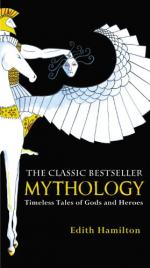|
This section contains 699 words (approx. 2 pages at 400 words per page) |

|
Mythology Summary & Study Guide Description
Mythology Summary & Study Guide includes comprehensive information and analysis to help you understand the book. This study guide contains the following sections:
This detailed literature summary also contains Topics for Discussion and a Free Quiz on Mythology by Edith Hamilton.
This book explains the main concepts of the Greek and Norse mythologies, including their gods and how the world was made. It then summarizes some of the most important myths of each. In most cases, these center around specific heroes, individuals or families.
The main Greek gods and their roles were: Zeus (the Roman Jupiter), the king of the gods and the god of the sky and thunder; Poseidon (Neptune), god of the sea; Hades (Pluto), god of the underworld; Demeter, goddess of crops and agriculture; Hera (Juno), goddess of women and marriage; Aphrodite (Venus), goddess of love; Ares (Mars), god of war; Hermes (Mercury), the messenger of the gods and god of travelers and merchants; Hephaestus (Vulcan), god of blacksmiths; Athena (Minerva), goddess of wisdom, crafts and civilization; Apollo, god of light, culture and truth; Artemis (Diana), goddess of the hunt and the woods; and Dionysus (Bacchus), god of grapes, wine and theater. The male gods, especially Zeus, liked to indulge in affairs with mortal women, leading to the birth of many semi-divine heroes and lesser gods.
The main Norse gods and their roles were: Odin, the king of the gods and the sky-father; Balder, god of light and happiness; Thor, god of thunder; Freyr, goddess of things that grow from the earth; Tyr, god of war; Freya, goddess of love and beauty; and Hela, goddess of death. There was also Loki, the trickster fire-god, who was technically not a god but the son of a giant.
One of the most important Geek heroes was Hercules, who completed twelve seemingly impossible tasks to make up for the murder of his family, and was eventually allowed to join the gods in Olympus. Theseus was the hero of Athens, who slew the fearsome Minotaur of Crete and escaped King Minos' labyrinth. He ruled wisely and fairly as king of Athens, giving power back to the people. Perseus was the hero who fought Medusa and brought back her head. He also killed the sea monster that was about to eat a beautiful maiden called Andromeda, whom he later married. Jason was the hero who went on a famous voyage to bring back the Golden Fleece from Colchis. Atalanta was a female hero who took part in the Calydonian Boar hunt. She challenged all suitors to a foot-race, which she always won, until one day a man was able to defeat her with the help of Aphrodite. The Trojan War saw many heroes fight on both sides, the most important being the Greek Achilles and the Trojan Hector. When the two fought, Achilles won, but he was killed soon after by an arrow to his heel, his one vulnerable spot. After ten years the Greeks won the war. The Greek hero Odysseus took a further ten years to get home afterward, facing many dangerous people and monsters on the way. He blinded the Cyclops, defeated the witch Circe's spell, and killed the suitors who were trying to win his wife. The Trojan Aeneas had similar adventures on his way to Italy, where he founded Roman society. These were the most important heroes of mythology. Other myths told the tales of the loves of the gods, or explained the origins of various plants, animals and stars. Some held moral lessons, and others were merely entertainment.
One of the most important Norse heroes was Sigurd, the man who won a Valkyrie maiden called Brynhild but was tricked into taking a love potion that made him love another woman. He then won Brynhild for another man, King Gunnar. When Brynhild found out the truth, she had Sigurd killed before committing suicide. Another Norse myth involved a woman called Signy, who planned for vengeance against her husband, who had killed her father and brothers. When her scheme was completed, she entered the burning house to die with her husband and their children. These two examples are typical of the Norse idea of heroes struggling against their doomed fate. The gods also faced a dark future as they were fated to lose in a final battle against the frost giants at the end of the world. Nevertheless, they never gave up the fight.
Read more from the Study Guide
|
This section contains 699 words (approx. 2 pages at 400 words per page) |

|



